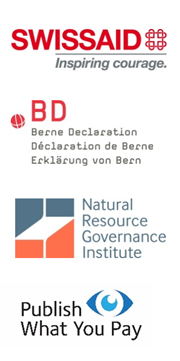
Switzerland Must Seize Opportunity for Commodity Trading Transparency
Berne, October 20, 2015—Switzerland, the world’s leading commodity trading hub, must pave the way for more transparency in natural resource payments. The Swiss government should alter its course and include commodity trading in a pending transparency law.
This article also in: French.
EITI can also do more to improve visibility into commodity trader payments
Berne, October 20, 2015—Switzerland, the world’s leading commodity trading hub, must pave the way for more transparency in natural resource payments. The Swiss government should alter its course and include commodity trading in a pending transparency law.

Furthermore, the Extractive Industries Transparency Initiative (EITI) must improve its requirements around commodity trading at its Berne meetings, which start today.
At least 60 percent of the global trade in metals and 35 percent of global crude oil trading occurs in Switzerland, the world’s leading commodity trading hub. The transactions of Switzerland-based trading companies are therefore of critical interest to many resource-rich developing countries.
According to a study by the Natural Resource Governance Institute (NRGI), Berne Declaration (BD) and SWISSAID, Swiss commodity traders paid $55 billion to the governments of ten African countries in exchange for crude oil between 2011 and 2013. This is equivalent to 12 percent of the countries’ combined government revenues, and more than double the amount of global development aid received by those countries.
These payments can incur many governance risks; in order to minimize these risks, more information about the underlying transactions is needed. The EITI has included commodity trading in its provisions, which 48 countries have volunteered to adopt. However, further refinement of the relevant requirement in the EITI Standard is on the agenda at this week’s EITI Board meeting in Berne, Switzerland. In a new position paper, NRGI, BD, SWISSAID, and the global civil society coalition Publish What You Pay (PWYP) strongly urge EITI’s board to require that countries break down payments by individual sales.
“It is only with this level of granularity that reporting delivers valuable and concrete information that can lead to public debate and more accountability, two key principles of the EITI Standard,” said Marinke van Riet, International Director of PWYP and an EITI board member.
There are however many countries which do not participate in the EITI. In order to close this significant transparency gap in the natural resource sector, the Swiss government should subject Switzerland-based commodity trading companies to regulation. Next month, the Swiss parliament will receive a revision of the Swiss company law. In the current draft, the Swiss Federal Council applied the payment disclosure provisions only to exploration and production activities, thus excluding trading—even though traders dominate the Swiss commodity sector. If the government does not alter its course, the Swiss transparency law will have limited added value for citizens of resource-rich countries. Governments in other jurisdictions where commodity traders have a significant footprint, such as the United Kingdom, should implement similar regulations.
Disclosure of payment data relating to the sales of commodities does not substantially affect competitiveness. This has been proven by the recent decision of trading giant Trafigura, which operates out of the Swiss cities of Geneva and Lucerne. The company has committed to disclose all payments to governments of EITI implementing countries, beginning this year. Not all companies will follow suit; therefore both EITI and the Swiss government should act to close the gap.
Read the position paper:
http://www.resourcegovernance.org/publications/pursuit-transparent-trading
More information and requests for interviews:
-
Alexandra Gillies, NRGI, +1 646 361 1563, [email protected]
- Alexandra Malmqvist, PWYP, +44 (0) 20 3096 7714, [email protected]
- Lorenz Kummer, SWISSAID, +41 (0)79 307 2592, [email protected]
- Oliver Classen, Berne Declaration, +41 (0)44 277 70 06, [email protected]